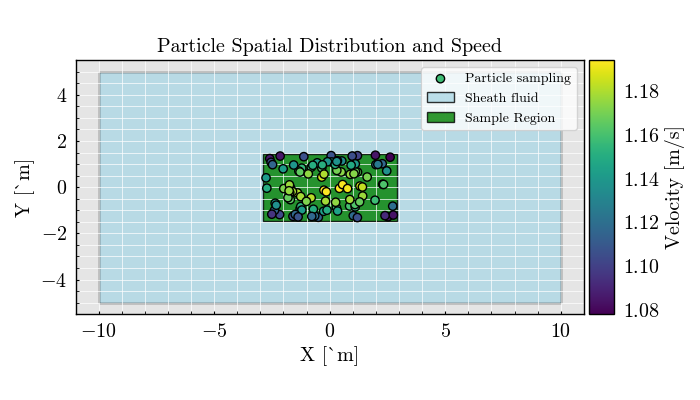Note
Go to the end to download the full example code.
Signal Processing in Flow Cytometry#
This example demonstrates how to apply signal processing techniques to flow cytometry data using FlowCyPy. The simulation is set up with a Gaussian beam, a flow cell, and two detectors. A single population of scatterers (with delta distributions) is used, and the focus here is on processing the forward scatter detector signals. Three acquisitions are performed:
Raw Signal: No processing applied.
Baseline Restored: Using a baseline restorator.
Bessel LowPass: Using a Bessel low-pass filter.
The resulting signals are plotted for comparison.
import matplotlib.pyplot as plt
import numpy as np
from TypedUnit import ureg
from FlowCyPy import FlowCytometer, SimulationSettings
from FlowCyPy.fluidics import distributions
# Import necessary components from FlowCyPy
from FlowCyPy.fluidics import (
FlowCell,
Fluidics,
ScattererCollection,
population,
)
from FlowCyPy.opto_electronics import (
Detector,
OptoElectronics,
TransimpedanceAmplifier,
source,
)
from FlowCyPy.signal_processing import Digitizer, SignalProcessing, circuits
# Enable noise settings if desired
SimulationSettings.include_noises = True
# Set random seed for reproducibility
np.random.seed(3)
# Define the optical source: a Gaussian beam.
source = source.GaussianBeam(
numerical_aperture=0.3 * ureg.AU, # Numerical aperture of the laser
wavelength=488 * ureg.nanometer, # Laser wavelength: 488 nm
optical_power=100 * ureg.milliwatt, # Laser optical power: 100 mW
)
Define and plot the flow cell.
flow_cell = FlowCell(
sample_volume_flow=0.02 * ureg.microliter / ureg.second,
sheath_volume_flow=0.1 * ureg.microliter / ureg.second,
width=20 * ureg.micrometer,
height=10 * ureg.micrometer,
)
# Create a scatterer collection with a single population.
# For signal processing, we use delta distributions (i.e., no variability).
population = population.Sphere(
name="Population",
concentration=5e9 * ureg.particle / ureg.milliliter,
diameter=distributions.Delta(value=150 * ureg.nanometer),
refractive_index=distributions.Delta(value=1.39 * ureg.RIU),
medium_refractive_index=1.33 * ureg.RIU,
)
scatterer_collection = ScattererCollection(populations=[population])
fluidics = Fluidics(scatterer_collection=scatterer_collection, flow_cell=flow_cell)
# Define the signal digitizer.
digitizer = Digitizer(
bit_depth="14bit",
saturation_levels="auto",
sampling_rate=60 * ureg.megahertz, # Sampling rate: 60 MHz
)
# Define two detectors.
detector_0 = Detector(
name="side",
phi_angle=90 * ureg.degree,
numerical_aperture=0.2 * ureg.AU,
responsivity=1 * ureg.ampere / ureg.watt,
dark_current=10 * ureg.microampere,
)
detector_1 = Detector(
name="forward",
phi_angle=0 * ureg.degree,
numerical_aperture=0.2 * ureg.AU,
responsivity=1 * ureg.ampere / ureg.watt,
dark_current=1 * ureg.microampere,
)
amplifier = TransimpedanceAmplifier(
gain=100 * ureg.volt / ureg.ampere, bandwidth=10 * ureg.megahertz
)
opto_electronics = OptoElectronics(
detectors=[detector_0, detector_1], source=source, amplifier=amplifier
)
signal_processing = SignalProcessing(
digitizer=digitizer,
analog_processing=[],
)
# Setup the flow cytometer.
flow_cytometer = FlowCytometer(
opto_electronics=opto_electronics,
fluidics=fluidics,
signal_processing=signal_processing,
background_power=2 * ureg.microwatt,
)
Signal Processing: Acquisition with Different Processing Steps#
fig, ax = plt.subplots(1, 1, figsize=(12, 6))
run_time = 0.1 * ureg.millisecond
# Acquisition 1: Raw Signal (no processing)
signal_processing.analog_processing = []
results = flow_cytometer.run(run_time=run_time)
ax.plot(
results.signal.analog["Time"].pint.to("microsecond"),
results.signal.analog["forward"].pint.to("millivolt"),
linestyle="-",
label="Raw Signal",
)
# Acquisition 2: Baseline Restoration
signal_processing.analog_processing = [
circuits.BaselineRestorator(window_size=1000 * ureg.microsecond)
]
results = flow_cytometer.run(run_time=run_time)
ax.plot(
results.signal.analog["Time"].pint.to("microsecond"),
results.signal.analog["forward"].pint.to("millivolt"),
linestyle="--",
label="Baseline Restored",
)
# Acquisition 3: Bessel LowPass Filter
signal_processing.analog_processing = [
circuits.BesselLowPass(cutoff=3 * ureg.megahertz, order=4, gain=2)
]
results = flow_cytometer.run(run_time=run_time)
ax.plot(
results.signal.analog["Time"].pint.to("microsecond"),
results.signal.analog["forward"].pint.to("millivolt"),
linestyle="-.",
label="Bessel LowPass",
)
# Configure the plot.
ax.set_title("Flow Cytometry Signal Processing")
ax.set_xlabel("Time [microsecond]")
ax.set_ylabel("Signal Amplitude [millivolt]")
ax.legend()
plt.tight_layout()
plt.show()

Total running time of the script: (0 minutes 1.096 seconds)
